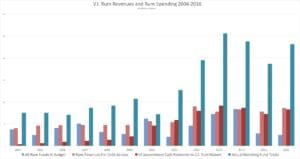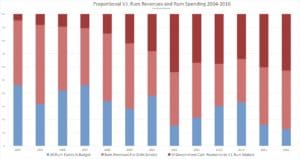The V.I. government is at a crossroads, facing budget deficits, growing debt and an inability to borrow.
The first four parts of this series dealt with how we got here and the roles of the closure of Hovensa and growing insolvency of the Government Employee Retirement Plan. But we got a big new rum distillery that came online in 2012. It was supposed to bring in hundreds of millions of dollars in new revenue. What happened? Wasn’t that supposed to save us?
When Gov. John deJongh Jr. inked a deal to bring the Diageo Captain Morgan Distillery to St. Croix, it was supposed to bring in hundreds of millions of dollars a year in new federal excise tax revenues. DeJongh justified the government paying to build the factory and giving Diageo generous new subsidies with the prospect of those new funds.

Total rum revenues increased dramatically when Diageo’s distillery came online in 2012, alongside the existing Cruzan Rum distillery. But direct cash subsidies to rum companies shot up dramatically. And more and more of the rum revenues went to pay debt service, with the emergency borrowing in the years between 2008 and 2014. (Figure 9: V.I. Rum Revenues and Rum Spending 2004-2016) (2014-2016 subsidy levels are estimated, based on contracted subsidy percentages and relative rum revenue levels)
Total revenues have increased a lot, but much less than expected when the V.I. government promised massive increases in cash subsidies. In 2009, when the V.I. government pledged its future federal alcohol excise taxes for bonds to pay to build Diageo’s distillery on St. Croix, government analysts projected the USVI to get $302.3 million from the federal government. Those were the figures bandied about in Senate testimony and in Public Finance Authority loan documents. But it actually got $231.5 million. That’s a lot but it is still $70 million less than expected.
And the territory bumped up its cash payments to rum makers in 2010, as part of the Diageo deal; again in 2012, to support Cruzan Rum and compete with subsidy increases Puerto Rico put in place to compete with the 2010 V.I. changes. The USVI increased cash subsidies once more in 2014, again to try to stave off competition from Puerto Rico.
With ever increasing cash subsidies, rising levels of debt payments and smaller than promised increases in rum revenues, net rum funding actually in the V.I. government budget was lower in 2016 than it was in 2004.

The way debt service and cash subsidies are crowding out funding to the budget is even clearer if you look at them proportionally. (Figure 10: Proportional V.I. Rum Spending)
Was the Diageo Deal Worth It?
The territory has historically given rum producers extensive breaks on local taxes, relying almost entirely on the federal alcohol excise tax revenues the federal government remits to the territory – plus the personal income taxes of distillery employees. It also historically gave direct cash payments to distillers, calling them a “molasses subsidy.” In 2009, deJongh enticed Diageo to build a massive new distillery on St. Croix by agreeing to vastly increase the cash subsidies and to take out bonds, secured by future federal alcohol excise tax money, to pay the entire cost of building the distillery.
The deal outraged Puerto Rico and was heavily criticized by some V.I. elected officials, notably Sen. Neville James (D-STX) who said it was far too generous and set a bad precedent. James has consistently been in the governing majority, but non-majority senators like Sen. Positive Nelson (ICM-STX) have also been highly critical.
Puerto Rico officials tried, unsuccessfully, to get legislation passed in Congress limiting direct cash subsidies.
DeJongh has always said and maintains today the deal was worth it because Diageo would not be on St. Croix otherwise and there would have been no increase in rum revenues. He points to the increased total rum revenues, which allowed the government to issue hundreds of millions of dollars in bonds, without which the territory would have been forced to lay off thousands of employees. These things are true.
On the other hand, there has been an ongoing spiral in subsidies, with distillers pitting the USVI and Puerto Rico against each other, bidding higher and higher, to keep their own shares of rum sales from dropping.
Getting a new distillery to the USVI at any cost is arguably worth it, from the perspective of a territorial governor, With the cards available to a governor, getting Diageo to the territory at any cost may make sense because it will generate at least some jobs and some revenue.
From the broadest, national or even moral perspective, it is hard to argue that highly profitable international liquor conglomerates are the best candidates for near total tax forgiveness. Nonetheless, both Puerto Rico and the Virgin Islands are locked in a struggle to compete for those companies. If either side provides even a slight increase in subsidies, it reduces the price of that territory’s bulk rum, causing a dramatic shift in bulk rum sales to whoever provides more subsidies. The hand of the market may hold the whip but the market is not just distorted but completely sculpted and shaped by the artificial binary fight over government cash subsidies created by Congress.
It is not clear what a governor could do about this dynamic. Only Congress can change the tax laws regarding subsidies to rum distillers. Hoping for coherent, thoughtful and helpful action soon from the current Congress may be optimistic. But Congress is where the change needs to happen.
Next: Part 6: Where Else To Find Revenue?
Read the whole series:
How Did We Get Here, How Do We Get Out?
The V.I. Budget Crisis: Part 2, The Hovensa Effect
The V.I. Budget Crisis, Part 3: The GERS Time Bomb
The V.I. Budget Crisis Part 4: Debt or Spending? What To Worry About
V.I. Budget Crisis Part 5: Weren’t Rum Funds Supposed To Save Us?
The V.I. Budget Crisis: Part 6, Technology Park Tax Breaks
The V.I. Budget Crisis: Part 7, What About Horse Racing and Casino Gambling?
The V.I. Budget Crisis: Part 8, Gubernatorial BloaThe V.I. Budget Crisis: Part 9, Hyperactive Legislating
The V.I. Budget Crisis: Part 9, Hyperactive Legislating
The V.I. Budget Crisis, Part 10: Chronic Overtime
The V.I. Budget Crisis, Part 11: Education, Where The Big Spending Is
The V.I. Budget Crisis, Part 12: What Else Can the USVI Do To Help? Rationalizing Government Agencies
The V.I. Budget Crisis: Part 13: Finding New Revenues – AirBnB and Marijuana
The V.I. Budget Crisis, Part 14: Medicaid and Medicare
The V.I. Budget Crisis: Part 15, Rum and Congress
The V.I. Budget Crisis, Part 16: Irma and Maria Make A Bad Situation Worse
V.I. Budget Crisis Part 17: Federal Help Is Coming, But Not Enough
V.I. Budget Crisis, Part 18: Honesty Makes the Best Policy
V.I. Budget Crisis, Part 19: Congress Can Still Do a Lot – But If It Doesn’t, Brace For Impact






How are you treating the molasses subsidies? If the subsidies come from the general fund, then you would have to add another 28 million (assuming 14 million each for Diageo and Cruzan) that is given to the rum producers.
In Rhode Island the smallest of all states population 1,000,000…The Governor drives his own car with the exception of formal occations…Why does the Governor of the Virgin Islands ith 100,000 citizens need such tight security and a driver where ever he goes at taxpayer expense..It isn’t like he is President of the US
What happened to the $200 to $300 million that was suppose to be from the HOVENSA sale?